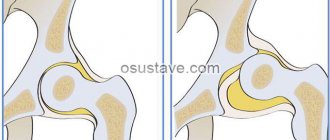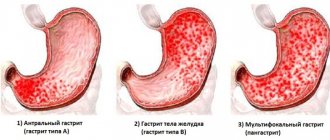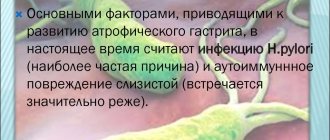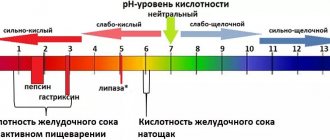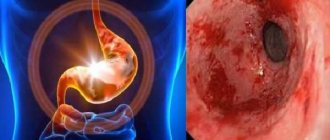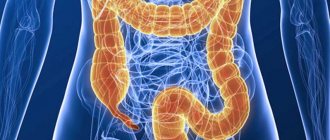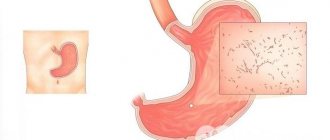This form of the disease can be acute, or its chronic course can develop, depending on the etiological factor, the speed of diagnosis and the initiation of proper treatment. The symptoms of this pathology are quite striking, significantly worsening the patient’s well-being and quality of life. In some cases, the course of ulcerative gastritis is complicated by life-threatening conditions that require immediate surgical intervention.
Causes
The main risk factors for inflammation of the gastric mucosa with the appearance of ulcerative defects on it are the following diseases and pathological conditions:
- Taking medications (NSAIDs, steroid hormones, vasoactive agents, antibiotics, iron supplements).
- Long-term influence of stressful situations, depression, increased anxiety. Such conditions provoke the release of hormones by the adrenal glands, which adversely affect the condition of the gastric mucosa.
- Bad habits (smoking, alcohol abuse, cocaine addiction).
- Diseases of the endocrine system (diabetes mellitus, pathologies of the pituitary gland, thyroid, parathyroid glands, adrenal glands).
- Acute poisoning from poor quality food containing pathogenic microorganisms (salmonella, E. coli, Klebsiella).
- Inflammatory disease of the gastric epithelium with overproduction of hydrochloric acid and the enzyme pepsin. This condition is called pre-ulcerative gastritis.
- Damage to the gastric mucosa by chemicals (acid, alkali)
- Bacterial ( Helicobacter , hemolytic streptococcus ), viral (causative agent of herpes, CMV) or parasitic (larvae of the helminth Anisakis simplex) lesions of the stomach wall with severe immunodeficiency.
- Intoxication of the body (with decompensation of renal and liver failure, with sepsis, widespread burns and injuries), causing ischemic changes in the wall of the stomach, leads to dysfunction of mucosal epithelial cells. As a result, mucus production and the formation of a mucous-bicarbonate layer, which normally protects the inner wall of the stomach from the negative influence of most external factors, are reduced.
- Errors in nutrition: frequent irritation of the mucous epithelium by spicy, smoked foods.
- Duodenogastric reflux is the reflux of the contents of the duodenum with bile and pancreatic enzymes into the lumen of the stomach.
Clinical picture
Symptoms of the disease are represented by dyspeptic manifestations, signs of gastric bleeding during its development, symptoms of intoxication with a pronounced inflammatory process:
- Abdominal pain in the epigastric region (the space between the sternum and the navel), may radiate to the center of the chest, to the peri-umbilical region and to the area of the right or left hypochondrium. In this regard, a differential diagnosis of gastric ulcerative gastritis should be made with other diseases of the digestive tract, as well as with cardiac pathology. That is, pain is not a symptom specific to ulcerative gastritis.
- Nausea , vomiting , sometimes mixed with blood (so-called “coffee grounds” vomiting).
- Heartburn , belching, characteristic of chronic ulcerative gastritis.
- The stool is black , which indicates the presence of blood in it that has been in the acidic environment of the stomach.
- Abnormal bowel movements and increased formation of gases in the digestive tract. The functioning of the intestines is disrupted due to poor functioning of the inflamed stomach, which does not digest food sufficiently, as well as due to the possible presence of blood in the contents, which irritates the condition of the intestinal mucosa.
- Weakness , dizziness, pallor of the skin and visible mucous membranes, decreased systemic blood pressure and other signs of anemia caused by blood loss.
Prevention
It is important to consider that the development of gastritis is associated with a person’s emotional state. Stress, nervous tension, and depression contribute to the development of severe forms and the formation of erosions, so treatment and prevention must begin in a good mood.
Nutrition is very important. The daily diet should be divided into several meals. Between main meals there should be healthy snacks. Feelings of hunger should not be allowed to arise. It is also recommended to remove foods that increase gas formation from the diet. Gastritis occurs at any age. It is important to start treatment in a timely manner to prevent the development of a chronic form.
Complications
If the patient ignores the signs of chronic erosive gastritis or does not promptly consult a physician, gastroenterologist or surgeon, this pathology is often complicated by the development of a life-threatening disease - gastric ulcer.
An ulcer develops when ulceration spreads from the mucous membrane to the submucosal layer of the gastric wall. It is dangerous due to the development of intense gastric bleeding, perforation of the stomach wall with the formation of peritonitis, and malignancy of a peptic ulcer (degeneration of altered tissues of the mucous membrane into a malignant tumor).
Diagnostics
When the first signs of gastritis appear, you should immediately consult a specialist - a therapist or gastroenterologist. After a thorough interview detailing all complaints and medical history and the patient’s life, the doctor prescribes the examination necessary to make a diagnosis.
Laboratory methods
To identify signs of inflammation and determine the etiological factor of erosive gastritis, the following tests are prescribed:
- general clinical blood and urine tests;
- biochemical blood test;
- a breath test to determine the concentration of ammonia in the patient’s exhaled air, which increases in the presence of the microorganism Helicobacter pylori in the gastric microflora.
Instrumental methods
The most informative method for detecting erosive and ulcerative defects on the surface of the mucous membrane is endoscopic examination ( FGDS ). Gastroscopy allows you to confirm the presence of erosions, their number and prevalence.
In addition, you can perform a biopsy: take a piece of mucosal tissue for subsequent histological examination and confirm the diagnosis.
Treatment
The approach to the treatment of ulcerative gastritis should be comprehensive. First of all, it is necessary to eliminate the etiological factor: follow the diet recommended by the doctor, lead a healthy lifestyle, get rid of bad habits, and, if possible, stop taking medications that are dangerous to the stomach. Then strictly adhere to the treatment prescribed by the specialist, including pathogenetic effects and elimination of gastritis symptoms.
Diet food
Diet for gastritis is the key to successful treatment. It is important to create a healthy menu for every day and strictly adhere to it. Usually the diet is prepared by a gastroenterologist. List of foods that are prohibited:
- fried, fatty foods;
- salty, spicy, sour;
- sweets, chocolate;
- alcohol;
- fresh pastries, bread;
- legumes;
- rice;
- mushrooms;
- cabbage;
- coffee;
- fatty meats;
- canned food
Such products are not recommended for healthy people, and with gastritis they can significantly aggravate the development of the disease. The list of useful and permitted products is quite extensive:
- dishes should be steamed or boiled;
- lean meat (turkey, chicken, rabbit);
- vegetable broth soups with cereals;
- boiled eggs and steamed omelettes;
- compotes from sweet fruits.
The main rule is to chew food thoroughly or eat it soft. The ideal option would be puree. Nutrition should be balanced, fortified and healthy. A person must receive the required amount of proteins, fats, carbohydrates and microelements from the diet.
Diet
Borjomi and Narzan mineral water , especially during exacerbation of gastritis, as it normalizes the acidity of gastric juice and the formation of a protective mucous-bicarbonate barrier on the inner surface of the stomach.
In case of intense pain, bleeding and other signs of exacerbation of the disease, it is recommended to observe fasting and bed rest in the first days to speed up the healing of the mucous membrane. Usually the epithelium recovers in about 1.5 weeks. After the exacerbation subsides, the diet can be expanded by introducing mucous soups, liquid porridges, and jelly.
During treatment, and even after its completion, the patient should switch to proper nutrition. The basic principles of such nutrition are to eat food that is steamed, boiled, stewed or baked. The diet should contain sufficient amounts of proteins, complex carbohydrates, polyunsaturated fatty acids, fiber, vitamins and microelements.
In addition, it is necessary to give up fast food, excessively fatty, salty, smoked foods, carbonated drinks, and alcohol.
Treatment of stomach diseases with folk remedies
Treatment of gastritis and stomach ulcers with folk remedies is not the main way to influence the disease. Traditional medicine methods can only serve as a complement to drug therapy in adults.
Treatment of gastritis
The following recipes are used to treat gastritis:
- Chop 100 g of lettuce leaves well and add 1 liter of boiling water. Keep the liquid in a closed container for 24 hours. Filter the liquid and drink 100 ml twice a day half an hour before meals. It is allowed to use the infusion for a month. The infusion is effective for chronic gastritis.
- 3 tbsp. l. Add fresh sea buckthorn berries to 250 ml of water and boil for 10 minutes. Filter the finished broth. Add 3 tbsp to it. l. honey and mix thoroughly. Take 1 tsp on an empty stomach. This drink helps with inflammation in the stomach.
- Squeeze the juice from 2 potato tubers and drink on an empty stomach. After using the product, it is recommended to lie down. Eating is allowed no earlier than 1 hour later. Duration of treatment – 1 month.
- Grind 10 grams of licorice root, place in a thermos and pour 1 liter of boiling water. Infuse the liquid for 24 hours. Strain the liquid. The finished product is consumed 100 ml before meals. Treatment consists of 2 courses of 15 days each with a break of 5 days. The product is indicated for gastritis with high acidity.
- For erosive gastritis, a honey solution is effective. To prepare it, 2 tbsp. l. Dissolve honey in 250 ml of warm water and stir well. Drink a glass of the product every day for 14 days.
- Heat one glass of honey a little. Grind 5 large aloe leaves into a paste. Combine ingredients. Take 1 tbsp. l. before eating. Keep refrigerated. Honey and aloe effectively fight the manifestations of gastritis.
Ulcer treatment
Treatment of stomach ulcers with traditional methods, especially herbs, but in combination with medication therapy, helps to normalize impaired stomach functions. For this you can use:
- Herbal collection. Mix St. John's wort and centaury herbs in equal proportions. Pour half a liter of boiling water over the mixture. Then filter the liquid and take it in 5 approaches throughout the day. The duration of the course is 10 days.
- Boil a large potato tuber in unsalted water. Pour the finished broth into a container and drink half a glass at least 2 times a day. The duration of treatment is 10 days.
- Mix plantain grass, string, celandine, St. John's wort in equal proportions. 1 tbsp. l. pour 250 ml of boiling water into the mixture. Leave the mixture for 2 hours and strain. Take 1 tbsp. l. more than three times a day. This method can be used for 30 days.
Drug therapy
The action of drugs prescribed for the treatment of ulcerative gastritis should be in different directions:
- Antibiotic therapy when Helicobacter or another pathogen is detected: Amoxiclav , Levofloxacin , Clarithromycin , Metronidazole and others. This group also includes bismuth preparations, which also have a bactericidal effect, as well as a cauterizing and anti-inflammatory effect ( De-nol ).
- Reducing stomach acidity: histamine receptor blockers ( Famotidine , Ranitidine ) or proton pump inhibitors ( Omeprazole , Lansoprazole ).
- Stop bleeding: Dicynon , Vikasol , Etamzilat .
- Normalization of the digestive tract: Motilium , Cerucal.
- Healing defects on the mucous membrane: sea buckthorn oil.
- Formation of a protective film on the surface of the epithelium: Sucralfate .
- Vascular, metabolic drugs that improve microcirculation, metabolic processes in tissues, promoting rapid regeneration of damaged epithelium (Actovegin).
There are different schemes that determine how to treat ulcerative gastritis: three- or four-component, depending on the etiological factor.
Forecast
The prognosis for ulcerative gastritis is different. The outcome of the acute form of the disease depends on:
- age, gender of the patient;
- features of the clinical course of the pathology;
- presence of complications, underlying diseases;
- household and professional factors.
The acute form of ulcerative gastritis progresses rapidly. Therefore, it is necessary to cure the disease in a timely manner, follow the diet and the doctor’s recommendations. In general, the prognosis is favorable. The chronic form is incurable.
Physiotherapeutic methods
To accelerate the regeneration of the stomach wall, improve microcirculation, and reduce inflammatory manifestations, a course of physiotherapy is recommended. The following are considered the most beneficial for the stomach during rehabilitation treatment:
- magnetotherapy;
- UHF therapy;
- laser treatment;
- ultrasonic influence;
- paraffin therapy.
Treatment with unconventional methods should be carried out only with the permission of the attending physician and should not exclude the use of medications prescribed by a specialist. Self-medication and failure to seek medical help in a timely manner are very dangerous and can lead to the development of serious complications, some of which are life-threatening.
